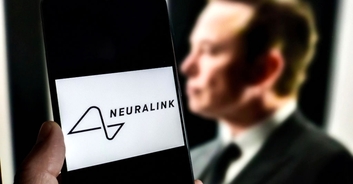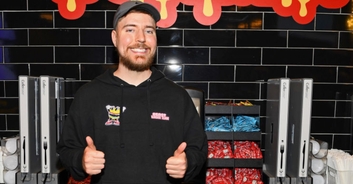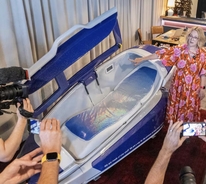Though we may joke about not having flying cars or hoverboards in the year 2018, the technology we have been able to develop is sort of insane when you think about it. Just a matter decades ago, there was no such thing as texting or the internet, no GPS systems or video calls; but now, we have all those things available to us on even the most basic of cell phones.
More recently, though, with the likes of artificial intelligence and supercomputers, the rate at which technology is progressing seems almost scary, and is starting to resemble something from Star Trek or Black Mirror rather than what we could consider normal, real-life stuff.
Just this week, in fact, news broke that a start-up company called Nectome was offering a 100 per cent fatal service which allowed people to preserve their memories on a computer. And, as crazy as that might sound, the project already has a volunteer: Silicone Valley billionaire, Sam Altman.
Altman made his riches partly by founding a company called Y Combinator, which funds start-ups such as Nectome. In exchange for a $10,000 investment, the billionaire has joined 24 other willing subjects on a waiting list to have his brain embalmed and simulated on a computer - something which, of course, will result in his death.
"The user experience will be identical to physician-assisted suicide," explained Nectome's co-founder, Robert McIntyre.
The euthanasia process involves taking a live "customer", hooking them up to a machine, and then injecting so-called "embalming chemicals" into their cateroid arteries in their necks. This keeps the body frozen and intact, and can prevent decomposition for thousands of years.
Nectome says that their mission is to "preserve your brain well enough to keep all its memories intact: from that great chapter of your favorite book to the feeling of cold winter air, baking an apple pie, or having dinner with your friends and family."
And they're very confident about the success of the project.
"We believe that within the current century it will be feasible to digitize this information and use it to recreate your consciousness," they said.
However, as the process qualifies as physician-assisted suicide, it is only legal in five US states. What's more, even where it is legal, the patient must have been diagnosed with a terminal illness, and can only consent to euthanasia if they have been given a prognosis of six months or fewer.
As far as we know, then, Altman cannot legally go through with this process just yet. But that hasn't stopped him building some anticipation for his transcendence.
"I assume my brain will be uploaded to the cloud," the 32-year-old said in an interview with MIT.
Obviously, this whole process has caused significant debate, with many people asking whether it's ethical to preserve life after death, and others questioning if it's even possible to simulate consciousness in a dead brain.
Whether or not you agree with it, though, it seems that this sort of technology could become commercialized in the relatively near future. Let's just hope they've ironed out all the kinks before then, because - unlike Altman - I'm guessing the vast majority of us wouldn't want to be human guinea pigs in the project.





